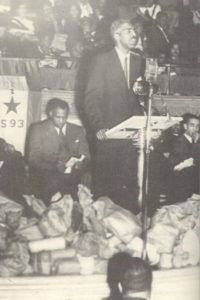
William A. Hunton Jr.
*William Alphaeus Hunton, Jr. was born on this date in 1903. He was a Black scholar and a political activist.
From Atlanta, Georgia, his grandfather, Stanton Hunton, was a slave, an abolitionist, and a close friend of John Brown who participated in planning the battle of Harper's Ferry. His father was William A Hunton Sr., and his mother was Addie Waites Hunton, a suffragist. The family moved to Brooklyn after the Atlanta Riots of 1906. Hunton attended Boys High School in Brooklyn and worked as a porter to finance his education after his father died prematurely in 1916. He graduated from Howard University in 1924 and Harvard University in 1926. He then became an instructor, lecturer, and assistant professor at Howard's English and Romance Languages Department. During this time, he was also a Ph.D. candidate at New York University and attended the founding convention of the National Negro Congress in Chicago in 1936.
He helped launch that organization's Washington, D.C. branch and was its Labor Committee's chairman. He led and participated in several campaigns to "blast Jim Crow out of Washington" and, in his own words, "make the District budget serve the human needs of the community." Through boycotts, picket lines, demonstrations, petitions, and strikes, they confronted racism against Blacks in the federal government, stores, hotels, and various branches of industry, as well as in health, education, and housing.
Hunton became the Educational Director of the Council on African Affairs in 1943 and assumed the role of executive secretary, assuring, often alone, the functioning of the entire organization until its conclusion in 1955. The CAA wanted to educate the general public about the history of Africa and its struggle against colonialism and imperialism. But the emergence of the Cold War and the increasing scrutiny of the House Un-American Activities Committee of civil rights and progressive organizations in this country hampered the work of the Council. The CAA and its officers were repeatedly investigated and accused of subversion, unpatriotic views, and disloyalty.
He published his book; Decision on Africa in 1957, and when President Sekou Toure invited him to immigrate to Guinea, he accepted. Hunton taught a course on Foreign Affairs at the Guinean National School of Administration and served as temporary editor of the weekly English bulletin of the Information Ministry. In 1962 he resigned from his appointment and accepted an invitation from W.E.B. DuBois to work in Ghana under his direction. As secretary of the Encyclopedia Africana Project at the Ghana Academy of Sciences, Hunton built their conceptual, human, and material framework. The ten-volume encyclopedia slated for publication under the auspices of the Organization of African Unity, beginning in 1970. With the overthrow of Nkrumah, however, he was demoted in late 1965 to the post of area editor.
Hunton was expelled from Ghana; following the expulsion order, he and his third wife sailed to New York in late 1966, only to return to Africa the following year on a personal invitation from Zambian president Kenneth Kaunda. Hunton began work on the history and collection of the nationalist movement in Zambia under the sponsorship of Kaunda’s Foundation. This project was also never completed.
William Alphaeus Hunton died of cancer in Lusaka on January 13, 1970, at 63.